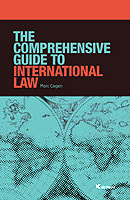Democracy is a legal obligation

The book was presented last Wednesday in Brussels. In his speech, professor Cogen explained how the current vision on international law makes democracy not just an option, but a legal obligation for states. He also said that Zimbabwe is one of the test cases for the international enforcement of this obligation.
Current opinio juris considers democracy not as an option but as a legal obligation. This does not mean that undemocratic regimes became the immediate object of a military operation. But it exposes these regimes to sanctioning, blaming and, if necessary and as a last resort, to international intervention.
One of the ongoing test cases is Zimbabwe. Its regime has been under sanctions by Europe and the U.S. although the UN Security Council has not imposed sanctions because African states were against it. However, Africa’s commitment to democracy and human rights are at stake here. If the African Union or a sub-regional organization such as the SADC cannot produce regime change in Harare, then the UN or the some important players in the international community will take over the leadership on this issue. Zimbabwe is a test to see if African states really live up to their African agreements such as the African Union Charter.
In the case of Somalia and Sudan/Darfur we have seen recently that African states were not successful in organizing and maintaining troops. Finally these questions were passed over to the UN Security Council which devised a hybrid structure of peace-keeping.
Democracy is firmly rooted in the human rights doctrine: free and fair elections, freedom of association, and freedom of expression. These three rights together are the minimal yardstick. And the most difficult right to uphold is the freedom of expression which proceeds the outcome of elections. I hope that we can undertake more research on democracy in the world.
The above is the official written version of his speech. If you watch this video you will discover some additional statements and comments by professor Cogen on this matter.



Reacties
Koen Robeys
zaterdag, 1 november, 2008 - 17:33"What these dangerous idealists do not see is that where the assumption of a moral responsibility involves that one's moral views should by force be made to prevail over those dominant in other communities, the assumption of such responsibility may place one in a position in which it becomes impossible to act morally. To impose such an impossible moral task on the victorious nations is a certain way to corrupt and discredit them."
Friedrich Hayek, The Road to Serfdom, chapter 15 (Routledge 2,006 edition, p. 234)
traveller
zondag, 26 oktober, 2008 - 16:04I share the sentiments of postbode.
Kindly give us some more meat on this bone, your ideas are seductive and definitely worth considering with more depth. I will buy the book and hope I will find the depth I seek.
BTW next time leave KDG home, I have no idea what he was talking about in his introduction, just rambling on.
postbode
zaterdag, 25 oktober, 2008 - 22:30I can't say I don't like it, but I'm very skeptical about whether this proposition is actually tenable. I haven't read the book and I don't know what his definition of democracy is, but there's nowhere near enough State practice (just look at two examples Kurt provides, and that's the very tip of the iceberg when it comes to State practice in this matter) that would make of democracy a binding obligation under international law. That is, if the opinion iuris argument would stand at all.
I do identify with professor's Cogen's assertions de lege ferenda. But under the current state of the law I'm afraid there is, in the very best case, only a momentum building toward the birth of democracy as a legal obligation. But we're still far from there. This is a very interesting discussion, however. If I might add a question: supposing there was a legal obligation to democracy under international law, what would the test be that would ultimately determine whether States are in compliance? What sources of the law would sustain this yardstick? Sorry if the professor elaborates on this in the video, but it was loading too slow here...
kurt
zaterdag, 25 oktober, 2008 - 22:20If Marc Cogen sees democracy as a legal obligation, how does he square that with the fact that two non-democratic countries (according to Cogen's yardstick), China & Russia, are permanent veto power members of the UN security council? How does he explain this in his book?